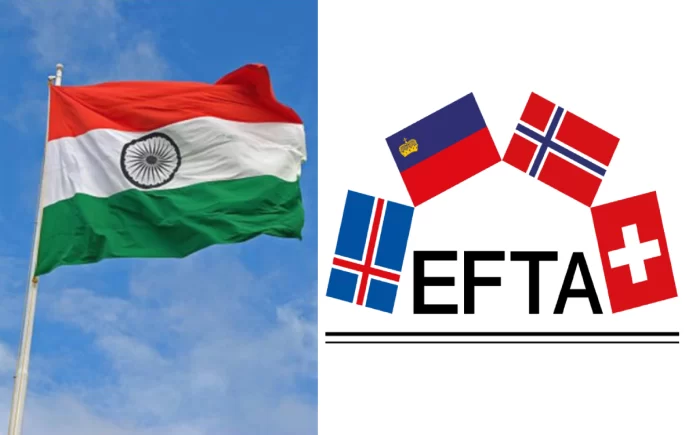New Delhi: In a significant move towards bolstering economic ties, India and the European Free Trade Association (EFTA) bloc, comprising Iceland, Liechtenstein, Norway, and Switzerland, solidified a free trade agreement (FTA) amounting to a potential $100 billion investment infusion into India. This milestone agreement is poised to enhance supply chain integration, fortify resilience, and carve out fresh avenues for businesses and individuals alike on both ends.
Under the leadership of Prime Minister Modi’s government, this marks the third substantial trade pact since early 2022. The previous agreements with the United Arab Emirates (UAE) and Australia have set the stage for India’s expanding global trade engagements. Notably, negotiations with the European Union and the UK are underway, although their finalization remains on the horizon.
Read More: Report Suggests India’s Role in Preventing Russian Nuclear Strike in Ukraine
Signed by Commerce Minister Piyush Goyal, alongside distinguished representatives including Swiss Federal Councillor Guy Parmelin, Iceland’s Foreign Minister Bjarni Benediktsson, Liechtenstein’s Foreign Minister Dominique Hasler, and Norway’s Trade Minister Jan Christian Vestre, the India-EFTA Trade and Economic Partnership Agreement (TEPA) promises extensive collaborations. People familiar with the matter, speaking on anonymity, disclosed that the EFTA states have pledged a substantial $100 billion investment over a 15-year span, while also encompassing vital aspects such as gender equality and environmental stewardship.
Read More: China Intensifies Control Over Internet Amid Key Political Summit
Prime Minister Narendra Modi hailed this pact as a pivotal moment in the bilateral relationship, signifying a robust commitment to mutual prosperity and inclusive partnership. He lauded TEPA as an innovative and balanced accord, reflective of the developmental aspirations of both India and the EFTA states.
Emphasizing the EFTA states’ global leadership in innovation and research across diverse sectors such as digital trade, finance, logistics, biotechnology, and pharmaceuticals, Modi envisioned a new era of collaboration between the nations. The agreement is anticipated to unlock novel avenues for cooperation, fostering economic growth and technological advancement.
Minister Goyal echoed Modi’s sentiments, portraying the agreement as emblematic of India’s resurgence and self-assurance on the global stage. Beyond fortifying supply chains, TEPA is anticipated to spur trade, investment, and employment opportunities, catalyzing sustainable growth.
Read More: UK’s Mental Well-Being Deteriorates, Ranked Second Worst Globally
Speaking on behalf of the EFTA states, Federal Councillor Guy Parmelin underscored the mutual benefits of market access and supply chain diversification. He highlighted India’s appeal as a dynamic market, poised to attract increased foreign investment from EFTA nations, thereby generating employment opportunities and fostering economic prosperity.
TEPA streamlines market access and simplifies customs procedures, easing the pathway for businesses from both sides to expand their operations. Additionally, the agreement aims to foster investment opportunities, facilitating seamless collaboration between India and the EFTA states.
While negotiations for the India-EFTA trade deal commenced in 2008, they experienced a lull after 2013, only to be reignited last year. As per government data, India’s exports to the EFTA region during January-December 2023 amounted to $1.87 billion, with imports exceeding $20.45 billion. Switzerland, notably, accounted for a significant share due to gold purchases.
India’s key imports from the EFTA countries include gold, silver, pharmaceuticals, and scientific equipment, while exports encompass chemicals, iron, steel, and precious stones, among others. With the formalization of TEPA, both India and the EFTA states are poised to embark on a new chapter of mutually beneficial economic cooperation and growth.



